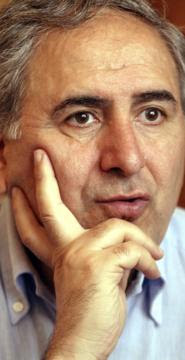Mehmed Uzun Kurdish writer who campaigned for Turkey to lift its ban on his language and culture

October 25, 2007
Mehmed Uzun
Kurdish writer who campaigned for Turkey to lift its ban on his language and culture
The writer and novelist Mehmed Uzun was one of the most influential figures in the struggle by the Kurds to maintain their culture and identity. One of the leading pioneers of modern Kurdish literature, he wrote a dozen novels in Kurdish and Turkish, the best known of which is In the Shadow of a Lost Love.
Uzun was born in Siverek, southeastern Turkey in 1953. During his childhood the use of Kurdish was forbidden, and last year he told an interviewer from the Milliyet newspaper how he was punished for speaking Kurdish in school: “I was slapped because I spoke Kurdish — I couldn't even speak Turkish.”
It was incidents such as this that helped to mould his opinions and eventually galvanised him to protest at the discrimination against the Kurdish population and to contribute, as a novelist and writer, towards the preservation of Kurdish culture.
In 1976, while he was the managing editor of a Turkish-Kurdish magazine, he was accused by the Government of “separatism”, arrested and jailed in Ankara for eight months. Even after his release, he was still threatened with indictment for his activities as a magazine editor, so in 1977 he fled Turkey and arrived in Sweden as a refugee.
In exile Uzun continued to write and publish Kurdish literature. He often travelled to the areas of northern Iraq held by Kurdish rebels to record poetry and stories. He learnt Arabic script so that he could read classical Kurdish poems from the 16th and 17th century. He also collected rare magazines published by Kurdish exiles in the 1920s and used this material in two books detailing the struggle of Kurds throughout the ages.
In To Create a Language Uzun dealt with the frustration of Kurds in Turkey at their inability to express their culture in their own language because of the ban imposed by the Turkish authorities. He also wrote about the trials of collecting oral literary traditions that were being systematically destroyed by the language restrictions.
In such works as Pomegranate Flowers and Introduction to Kurdish Literature Uzun described the history of novels written in Kurdish, the attempts to revive Kurdish and problems facing Kurdish literature. He further explored the tragedy of a people within a republic that was bent on erasing their identity in In the Shadow of a Lost Love, where he emphasises the sadness felt by intellectuals who have spent their lives pursuing freedom.
In 2000 Uzun was allowed to make a brief visit to Turkey. While there he gave a speech in the southeastern city of Diyarbakir in which he criticised the ban on Kurdish and called for Kurds to be educated in their own language. He was able to return to Sweden before charges were laid against him for instigating separatism. He was tried in absentia and eventually acquitted.
The campaign by Uzun and others for Kurdish rights in Turkey came to prominence in Europe when Turkey was applying for full membership of the European Union. Among the preconditions for any approval of Turkey's membership, the EU insisted that it must do more to improve the cultural rights of its Kurdish minority. In November 2002 the state broadcasting authority allowed state radio and television to air a limited number of programmes in Kurdish. This breakthrough owed much to Uzun's tireless campaigning efforts.
In 2005 Uzun returned to Turkey to live and in May 2006 he was found to have stomach cancer. He is survived by his wife, Zozan, and two children.
Mehmed Uzun, Kurdish writer and activist, was born in 1953. He died on October 10, 2007, aged 54

